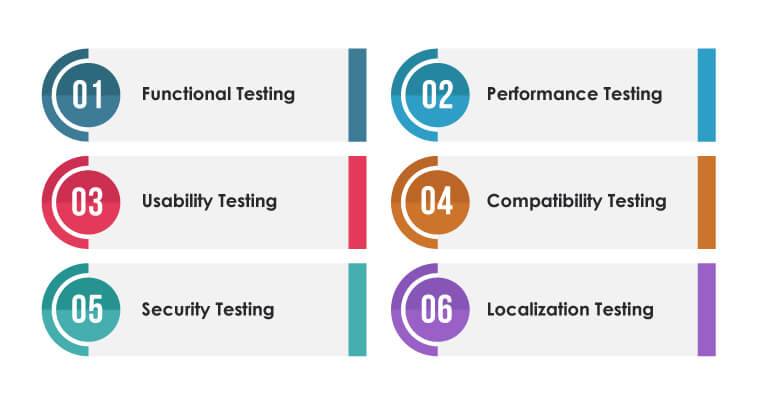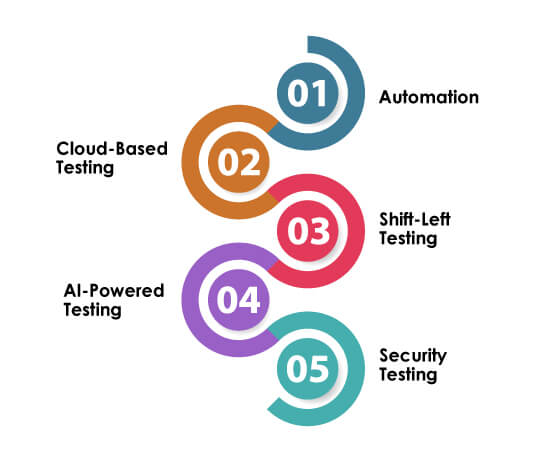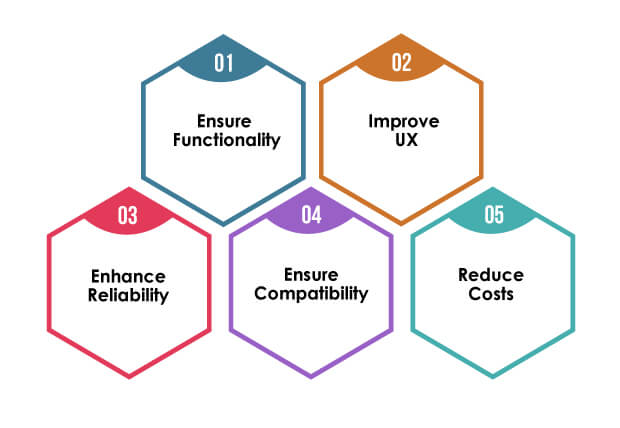
Mobile App Testing: An Overview
Mobile app testing is the process of evaluating the functionality, usability, performance, security, and other attributes of a mobile application before releasing it to the public. The purpose of mobile app testing is to identify and resolve any issues or bugs that could negatively impact the user experience, and ensure that the app functions as intended on different devices and operating systems.
There are several types of mobile app testing, including:

Functional Testing: This involves testing the core functionality of the app, such as user interface, navigation, and features.
Performance Testing: This involves testing the app’s performance in terms of speed, responsiveness, stability, and scalability.
Usability Testing: This involves testing the app’s ease of use, user interface, and user experience.
Compatibility Testing: This involves testing the app’s compatibility with different devices, operating systems, and screen sizes.
Security Testing: This involves testing the app’s security features and identifying any vulnerabilities that could compromise user data.
Localization Testing: This involves testing the app’s functionality in different languages, cultures, and regions.
Mobile app testing can be performed manually or using automated testing tools. Manual testing involves a human tester performing various test cases on the app, while automated testing involves using software tools to run pre-defined test scripts to identify issues automatically.
Top Mobile App Crash Incidents in the Recent Years
YouTube (2022): In December 2022, a number of iPhone users reported having problems with the YouTube app on iOS. Affected users reported that the app crashed within a minute of opening.
Robinhood (2021) – In January 2021, the popular stock trading app Robinhood experienced a major outage, preventing users from buying or selling stocks during one of the most volatile periods in the stock market. The outage sparked outrage among users and prompted an investigation by the U.S. Securities and Exchange Commission.
Google (2020) – In December 2020, a major outage hit Google’s suite of apps, including Gmail, Google Drive, and YouTube, affecting millions of users. The outage lasted for several hours and was attributed to a problem with Google’s authentication system.
Zoom (2020) – In March 2020, as the COVID-19 pandemic began to force people into remote work and learning, Zoom experienced a surge in usage. However, the app also experienced a number of crashes and security vulnerabilities, leading to widespread criticism and calls for the company to improve its privacy and security measures.
TikTok (2020) – In May 2020, a bug in the TikTok app was discovered that allowed hackers to access users’ private videos and personal information. The company quickly patched the bug, but the incident raised concerns about the security of the popular social media app.
Facebook (2019) – In July 2019, Facebook, Instagram, and WhatsApp experienced a widespread outage that lasted for several hours, affecting millions of users worldwide. The outage was reportedly caused by a server configuration change and prompted concerns about the reliability of these social media platforms.
These are just a few examples of the many mobile app crashes that have occurred in the past three years. While these incidents can be frustrating for users, they also serve as reminders of the importance of proper app development and testing, as well as the need for robust security measures.
The State of Mobile App Testing

As of 2023, the state of mobile app testing has advanced significantly due to the growing demand for mobile applications across various industries. With the increasing complexity of mobile apps, there has been a corresponding increase in the complexity of testing these apps.
Here are some of the key trends and developments in mobile app testing in 2023:
Automation:
Automation is becoming more prevalent in mobile app testing. This is due to the need to test multiple devices and operating systems, as well as the desire to reduce testing time and costs. Automation tools are now capable of performing complex tests such as visual testing and exploratory testing.
Cloud-Based Testing:
Cloud-based testing solutions are gaining popularity due to the ease of use, scalability, and cost-effectiveness they offer. These solutions allow testing teams to test apps on a range of devices and operating systems without having to purchase and maintain physical devices.
Shift-Left Testing:
The shift-left testing approach is gaining popularity in mobile app testing. This involves testing early and often in the development cycle to catch bugs and issues before they become more difficult and expensive to fix. This approach requires close collaboration between developers and testers.
AI-Powered Testing:
AI is being used more frequently in mobile app testing. AI-powered testing tools can analyze user behavior to identify potential issues and automatically generate test cases. AI can also be used to improve the accuracy of test results and identify patterns that are difficult to detect manually.
Security Testing:
With the increasing importance of mobile apps in the daily lives of users, security testing has become a critical aspect of mobile app testing. Security testing involves testing for vulnerabilities such as data breaches, malware, and other security threats.
Why Does Mobile App Testing Matter for an Imperative UX?
Mobile app testing is a critical process in ensuring that the mobile app provides an imperative user experience. Users expect apps to function flawlessly and meet their needs without any hiccups. Mobile app testing allows developers to identify and fix any issues that may hinder the user experience.
Without proper testing, an app may crash or freeze, which can be frustrating for users and lead to negative reviews and a decrease in app usage. Additionally, testing can ensure that an app is compatible with various mobile devices, operating systems, and network conditions.
Mobile app testing involves thoroughly testing the app on different devices, platforms, and networks to ensure that it works as expected and meets user needs. It also involves testing for different scenarios such as low battery, poor network connectivity, and different user inputs. This helps to ensure that the app is robust, reliable, and user-friendly.
Overall, mobile app testing is critical for ensuring that an app functions seamlessly and meets the expectations of its users. Investing time and resources into testing ultimately leads to a more successful app and a better user experience.
Benefits of Mobile App Testing for Digital Businesses

Mobile app testing is an essential part of the software development process, especially in today’s world where mobile applications have become an integral part of our lives. Here are some reasons why mobile app testing matters:
Ensure Functionality:
Mobile app testing helps ensure that the application functions as intended. It helps identify bugs and issues that could affect the functionality of the application.
Improve UX:
Testing helps ensure that the application provides an excellent user experience. It helps identify user interface issues, navigation problems, and other usability issues that could affect user experience.
Enhance Reliability:
Mobile app testing helps ensure that the application is reliable and stable. It helps identify performance issues, crashes, and other problems that could affect the reliability of the application.
Ensure Compatibility:
Testing helps ensure that the application is compatible with different devices, operating systems, and screen sizes. It helps identify compatibility issues that could affect the user experience and performance of the application.
Reduce Costs:
Testing helps identify and fix issues early in the development process, reducing the cost of fixing them later. It also helps reduce the risk of revenue loss due to poor user reviews and ratings.
Overall, mobile app testing is crucial for ensuring the quality, functionality, and reliability of mobile applications. It helps enhance user experience, reduce costs, and increase the likelihood of success in the highly competitive mobile app market.
Conclusion
Mobile app testing helps to ensure that the app functions smoothly and meets the needs of its users. By testing mobile apps, businesses identify and fix issues before the app is released to the public, which can save time and money in the long run. Additionally, thorough testing helps to enhance the user experience, increase user satisfaction, and ultimately drive more downloads and revenue. With the increasing importance of mobile apps in our daily lives, mobile app testing has become more critical than ever before. By prioritizing mobile app testing, developers can ensure that their apps are high-quality, reliable, and meet the needs of their users.
How TestingXperts Helps Businesses with Mobile App Testing?

TestingXperts (Tx) is one of the top 5 pure-play software testing company globally. Tx has been chosen as a trusted QA partner by Fortune companies and ensures superior testing outcomes for its global clientele. We have rich expertise in enabling end-to-end testing services for global clients across various industry domains like healthcare, telecom, BFSI, retail & eCommerce, etc.
Tx offers comprehensive and reliable mobile app testing services to ensure that your app is fully functional and meets the needs of your target audience. We understand that mobile app testing is a critical step in the app development process, and we take it very seriously. Our team of experienced testers is well-versed in testing all types of mobile apps, including iOS and Android apps, and we use a variety of tools and techniques to ensure that your app is thoroughly tested.
Tx Differentiators:
Here are some of the key business differentiators that set us apart from other mobile app testing services:
Comprehensive Testing:
We offer comprehensive testing services that cover all aspects of your app, including functionality, usability, security, and performance. We leave no stone unturned when it comes to testing your app, so you can be confident that it will perform flawlessly when it is released to your users.
Experienced Testers:
Our team of testers is highly experienced and knowledgeable, with a deep understanding of mobile app testing best practices. We use a variety of tools and techniques to ensure that your app is thoroughly tested, and we are always up-to-date with the latest trends and technologies in the mobile app testing space.
Flexible Services:
We understand that every app is unique, and that’s why we offer flexible testing services that can be customized to meet your specific needs. Whether you need a one-time test or ongoing testing services, we can create a testing plan that works for you.
Quicker Turnaround:
We know that time is of the essence when it comes to mobile app development, and that’s why we offer fast turnaround times for our testing services. We work quickly and efficiently to deliver your testing results as soon as possible, so you can keep your development process moving forward.
Affordable Pricing:
We believe that high-quality mobile app testing services should be accessible to everyone, which is why we offer affordable pricing options for our testing services.
Discover more
Get in Touch
Stay Updated
Subscribe for more info




